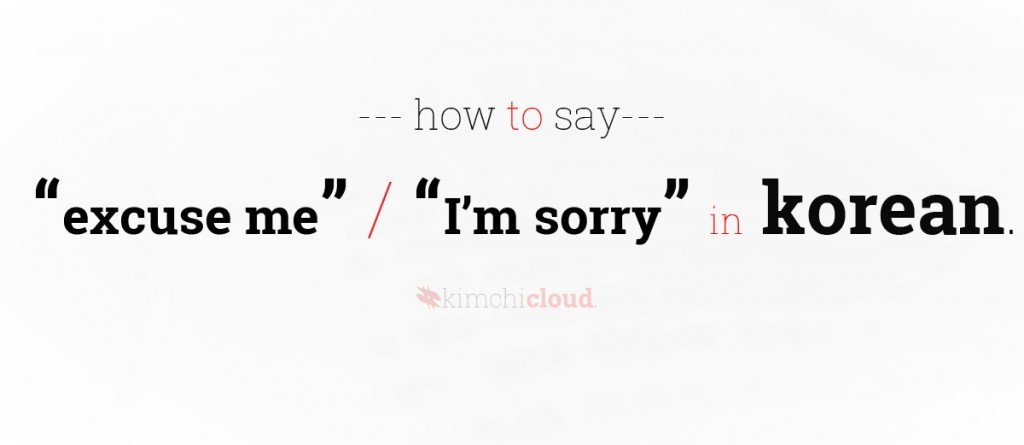죄송합니다 – How To Say Excuse Me / I’m Sorry in Korean

I’m sorry / Excuse me in Korean
In this lesson, we take a look at how to say “excuse me” or “I’m sorry” in Korean. There are a few words for this and some of them can only be used while apologizing while others can only be used when someone is in your way and you want to get through.
joesonghamnida
(in Hangul: 죄송합니다)
= I’m sorry, I apologize, excuse me ( very formal)
joesonghamnida (죄송합니다) literally translates to “I apologize” and you can use it when you’re actually apologizing to someone as well as to excuse yourself when passing through a crowd of people.
Note that, in case you are using it to say “I’m sorry”, you should only use it when you are actually apologizing for something. For example, if someone’s cat died and you use this word, it will sound like you are somehow responsible for the death of their cat.
Moreover, use this when talking…:
- in a formal setting
- to your boss
- to a customer
- to a teacher
- a stranger on the street / to strangers that you bumped into
- and you’re not sure what form or word to use.
joesonghaeyo
(죄송해요)
= I’m sorry, I apologize, excuse me (polite)
This form is identical in meaning to the one above but it is slightly less formal. As such, you should primarily use it when talking to…:
- someone older than you that you know well.
- someone of higher status (boss, teacher, senior etc) that you know well.
mianhaeyo
(미안해요)
= I’m sorry (somewhat polite)
mianhaeyo (미안해요) is almsot the same as joesonghae (죄송해요) but conveys a more informal apology. Therefore, it is proper to use it in situations where you are talking to…:
- a person of similar status and of same or younger age than you
mianhae
(미안해)
= I’m sorry (friendly / informal)
Drop the “yo” (요) at the end and you get the friendly / informal way of apologizing in Korean. Be careful and only use this with…:
- People who are younger than you
- Close friends
- Siblings
jamshimanyo
(잠시만요)
= Just a moment
It literally translates to “just a moment” and is used in a few different situations. For example:
- When you want to get through
- When you’re on the phone and needs the other person to wait
- When you’re busy and want the other person to wait.
Note that you can drop the “yo” (요) part at the end to make it friendly / informal.
jamkkanmanyo
(잠깐만요)
= Just a moment
jamkkanmanyo (잠깐만요) is the same as jamshimanyo (잠시만요) and you can use them interchangeably.
shille hamnida
(실례합니다)
= I apologize for interrupting
You can use this very polite expression when you want to excuse yourself for intruding or disturbing them. Therefore, it’s a good word to use when you’re in a cramped space with a stranger and want to go by them. It’s also a good word to use before you ask a stranger a question. In this case, you can use the form shillejiman (실례지만) which means “excuse me, but…” and then follow up with your question. For example:
shillejiman jigeum myeot shiyeyo? [실례지만 지금 몇 시예요?]
= Excuse me but, what time is it now?
Please like or share if you found this lesson useful. And if you have any questions or something else on your mind, make sure to leave a comment below and we will do our best to help you out!
By: Kimchi Cloud





Wow very useful thank you!